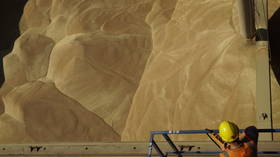EU ‘sleep walking’ into new dependence on Russia – industry major
The European Union is “sleep walking” into becoming dependent on Russian fertilizers, just as it did with natural gas, a leading producer has told the Financial Times.
Nitrogen fertilizers, widely used for plant growth, are made with natural gas, and the bloc is importing more and more of the crop nutrients from the sanctioned country, Svein Tore Holsether, CEO of Norwegian chemical producer Yara International, told the outlet.
“Fertiliser is the new gas,” Holsether said. “It is a paradox that the aim is to reduce Europe’s dependency on Russia, and now we are sleepwalking into handing over critical food and fertilising power to Russia,” he added.
Russia is one of the world’s largest producers and exporters of nitrogen-containing fertilizers. EU imports of urea, a common nitrogen-based crop nutrient, doubled from Russia in the year to June 2023 compared with the previous 12 months, the FT reported, citing data from Eurostat.
While Russian urea imports have declined since the start of this year they still account for about a third of the total brought into the bloc. According to the European Commission, the EU imported 24% of its total nitrogen fertilizer supply from Russia, with Egypt as the second-largest supplier at 22%.
Nitrogen-based crop nutrients are produced by mixing the chemical from the air with hydrogen from natural gas at high temperature and pressure. A spike in natural gas prices in 2022 following Western sanctions against Russia over the Ukraine conflict also drove fertilizer prices up, hitting European farmers financially. Moscow meanwhile saw its export revenue surge 70% in 2022.
Fertilizer prices have eased since then along with natural gas prices, but Europe’s fertilizer industry is still struggling as Russian imports take a bigger share of the market, Holsether said.
Western countries have not imposed any sanctions on Russia’s food and fertilizer exports since the start of its military operation in Ukraine in February 2022. Moscow complained however, that exports are hampered by sanctions as they make it harder for traders to process payments or obtain vessels and insurance.
You can share this story on social media:








Comments are closed.